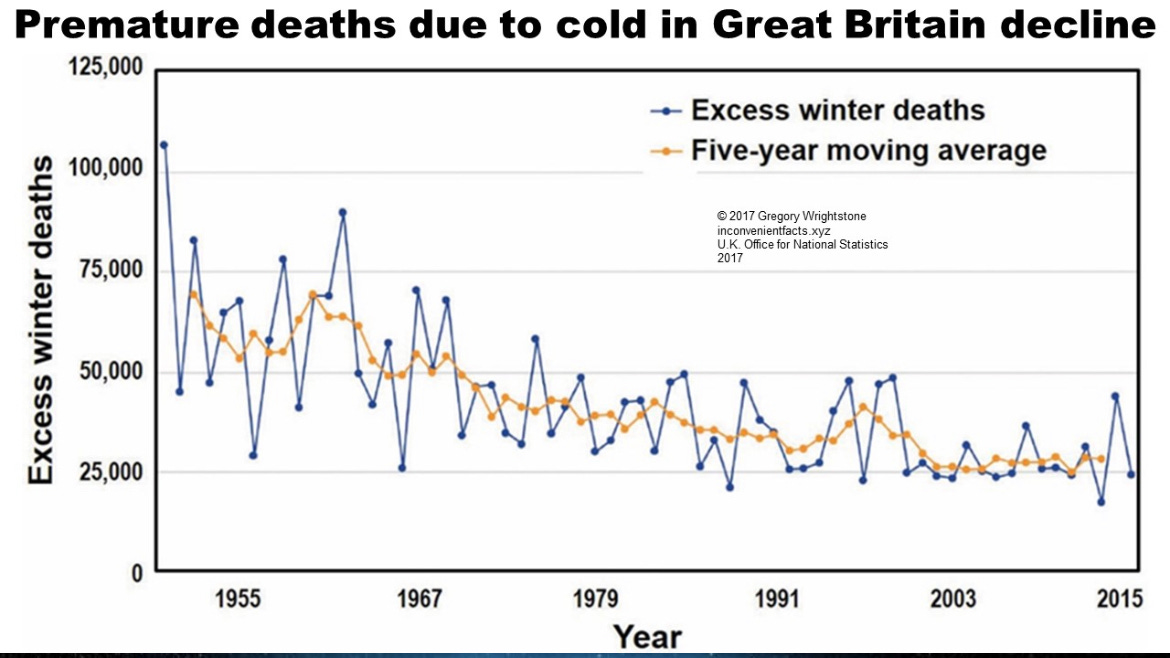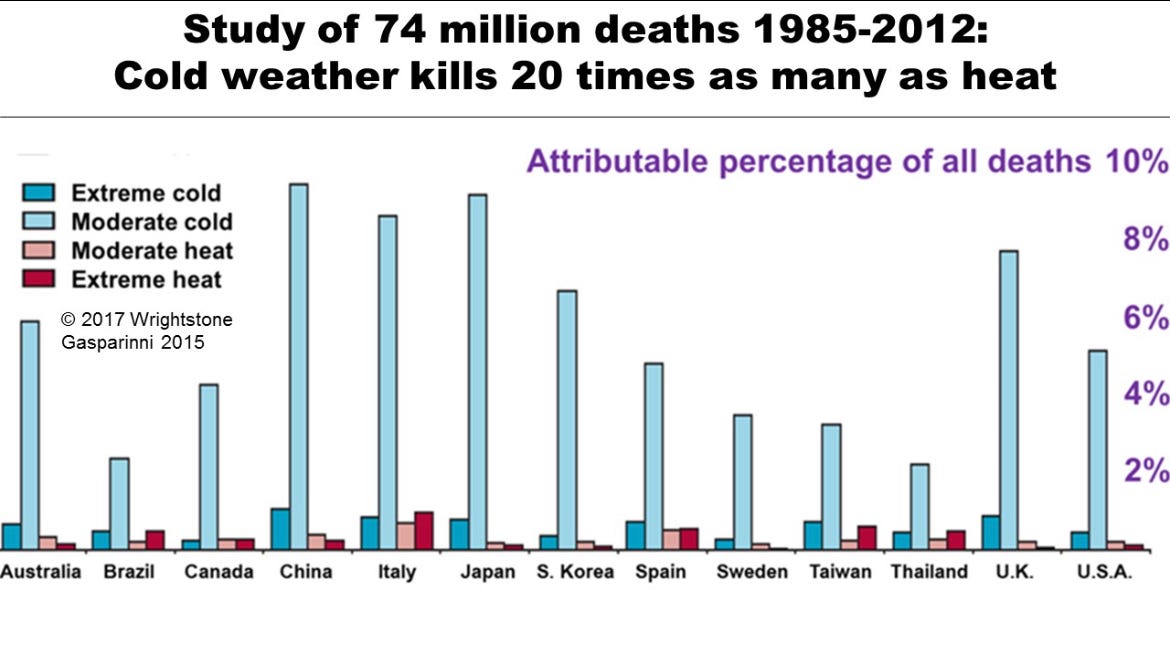Cold Weather Is More Deadly Than Heat: A Critical Public Health Perspective
Public Health Gains from Moderate Warming
Cold Weather Is More Deadly Than Heat: A Critical Public Health Perspective
Cold-related deaths consistently outnumber heat-related fatalities worldwide, yet this significant public health concern is often overshadowed in climate policy discussions. While extreme heat events dominate media attention, the impacts of cold weather on human health are far more severe. Moderate warming trends, contrary to alarmist narratives, could yield substantial public health benefits by reducing cold-related mortality and alleviating healthcare burdens during winter months.
Excess Winter Mortality
Cold Weather and Mortality Rates
Cold weather significantly increases death rates during winter months, a phenomenon known as excess winter mortality. This is particularly evident in countries with temperate and colder climates:
Respiratory and Cardiovascular Risks: In Canada, extended periods of extreme cold are linked to higher incidences of respiratory conditions such as pneumonia, bronchitis, and influenza, as well as cardiovascular issues like heart attacks and strokes.
UK Example: In the United Kingdom, cold-related deaths consistently outnumber those attributed to heat, with older populations being particularly vulnerable to cold exposure (Gasparrini et al., 2015).
Energy Poverty Worsens Cold-Related Mortality
Rising energy costs, driven by net-zero policies and renewable energy mandates, exacerbate the risk of energy poverty, particularly in rural and low-income communities.
Households unable to afford adequate heating face heightened risks of cold-related illnesses and fatalities.
Countries like Canada, where temperatures regularly drop below freezing, face unique challenges in ensuring public health during winter months.
Public Health Gains from Moderate Warming
Reduced Cold-Related Deaths
Moderate warming could significantly reduce cold-related mortality by lessening exposure to extreme cold.
Global Analysis: A study published in The Lancet found that cold weather accounts for 17 times more deaths than heat worldwide, underscoring the disproportionate health risks of cold exposure (Gasparrini et al., 2015).
Hypothermia and Respiratory Illnesses: Warmer winters could lead to fewer cases of hypothermia, respiratory infections, and cardiovascular complications.
Relief for Healthcare Systems
Fewer cold-related illnesses would ease pressure on healthcare systems, reducing hospital admissions and associated costs during winter. Public health resources could be redirected toward other critical areas, such as chronic disease management and preventive care.
Improved Living Conditions
Warmer winters would:
Reduce household heating demands, lowering energy costs and mitigating energy poverty.
Improve living conditions for vulnerable populations, such as the elderly and those with preexisting health conditions.
Broader Context: Cold vs. Heat Mortality
Cold-Related Deaths Far Outnumber Heat-Related Deaths
While extreme heat events can cause fatalities, cold-related deaths are far more frequent globally:
Heat-related risks are often mitigated through simple measures like hydration and cooling centers.
Cold-related risks require extensive infrastructure, such as reliable heating, insulated housing, and access to medical care, which are less accessible in low-income and rural areas.
Adapting to Heat is Easier than Cold
Humans and infrastructure are generally better equipped to adapt to heat than extreme cold:
Affordable Cooling Technologies: Air conditioning and other cooling methods are widely available and cost-effective.
Costly Heating Solutions: Effective winter heating systems, especially in extreme climates, require substantial resources and infrastructure.
Climate Policy Oversights
Neglect of Cold-Related Risks
Many climate policies disproportionately focus on reducing warming trends without addressing the significant public health benefits of moderate warming. This oversight can lead to unintended consequences, such as higher energy costs that worsen energy poverty.
Affordable Energy Access is Critical
Reliable and affordable energy is essential for public health in cold climates. Policies that prioritize energy affordability can prevent cold-related mortality and improve quality of life.
Policy Implications
Incorporate Public Health into Climate Policy
Policymakers should explicitly consider the health impacts of cold exposure and ensure strategies address risks associated with seasonal weather extremes.
Support Affordable Energy Access
Maintain diversified energy portfolios, including reliable sources like natural gas and nuclear power, to keep energy costs manageable.
Avoid over-reliance on intermittent renewables that compromise energy reliability during winter months.
Recognize the Benefits of Moderate Warming
Moderate warming can reduce cold-related mortality, alleviate healthcare burdens, and improve living conditions, particularly in colder regions. These benefits must be acknowledged in climate narratives and policies.
Focus on Resilience
Invest in public health infrastructure, community resilience programs, and affordable housing to mitigate risks associated with both cold and heat extremes.
Conclusion
Cold weather remains a far more significant public health threat than heat, with cold-related deaths vastly outnumbering heat-related fatalities. Recognizing the benefits of moderate warming, supporting affordable energy access, and emphasizing resilience can help policymakers create climate strategies that protect public health and improve overall well-being. A balanced approach to climate policy is essential to address the realities of cold-related health risks and to ensure vulnerable populations are protected.
References
Gasparrini, A., et al. (2015). Mortality risk attributed to high and low ambient temperatures: A multicountry observational study. The Lancet, 386(9991), 369–375.
UK Office for National Statistics (2017). Excess winter mortality in England and Wales: 2015/16 (provisional) and 2014/15 (final). Available at: ONS Report.
Liddell, C., & Morris, C. (2010). Fuel poverty and human health: A review of recent evidence. Energy Policy, 38(6), 2987–2997.
European Journal of Public Health. (2013). Cold exposure and mortality risk in Europe: An analysis of time-series data from 15 countries.
Lancet Countdown on Health and Climate Change. (2019). Policy brief for the UK: Health benefits of reducing cold weather exposure. Available at: Lancet Countdown.




